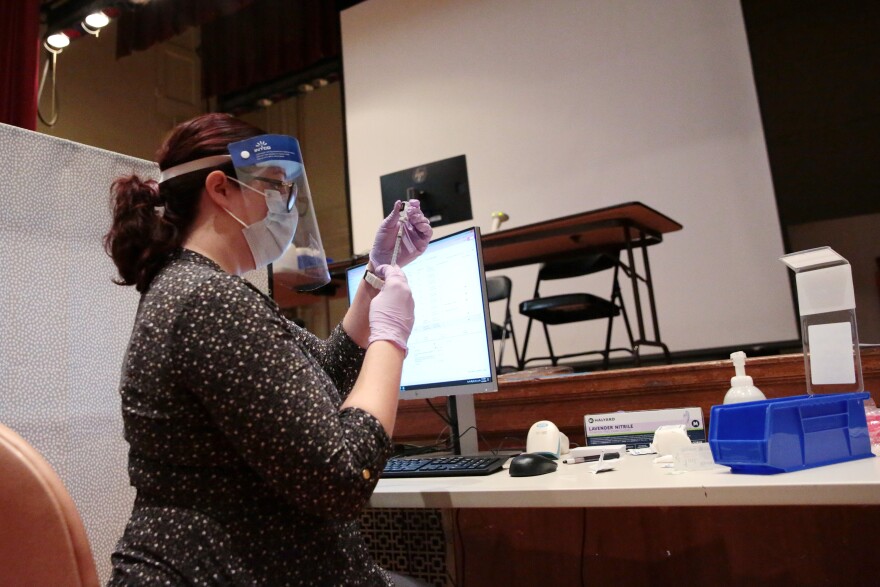More shipments of Pfizer-BioNTech’s COVID-19 vaccine arrived Tuesday at Connecticut hospitals, many of which began immediately vaccinating front-line workers.
That included Ivan Sarmiento, an emergency room registered nurse at Saint Francis Hospital in Hartford, a member of Trinity Health Of New England. He was cheered on by colleagues as he became the first employee to get a dose shortly before noon.
“I hope I serve as an example that, hey, I’m OK and this is a step in the right direction,” he said, adding that he’s having conversations about vaccination with friends and family as well. “As many people I can talk to, because I see this day in and day out and I see how it affects people, and I want this to end.”
Leaders at health organizations say they’re hopeful that this marks the beginning of the end of the COVID-19 pandemic, which has taken the lives of 5,466 people in Connecticut. Their efforts will get a boost as authorization of a second COVID-19 vaccine is imminent.
On Thursday, an independent group of science experts will review Moderna’s request to the U.S. Food and Drug Administration for emergency use authorization of it’s COVID-19 vaccine. Preliminary analysis shows the vaccine to be about 94% effective against the coronavirus.
If the process follows the same path as it did for Pfizer and BioNTech, the new vaccine could get authorization by the end of the week with doses arriving in Connecticut shortly.
State officials estimate that they’ll have about 31,200 doses of the Pfizer vaccine in hand by the end of this week. They estimate Connecticut will receive 98,400 doses next week — a combination of both Pfizer and Moderna vaccines.
“We’ve been actually preparing for this for weeks with the knowledge that we would have at least two vaccines probably available to us in this particular timeframe,” said Dr. Keith Churchwell, president of Yale New Haven Hospital.
The hospital, which was also a clinical trial site for Pfizer’s vaccine, began distributing its first doses to front-line workers Tuesday afternoon. Among them was Mackenzie Kelly, an emergency room registered nurse.
“I’m a mom, a nurse, a daughter. I haven’t seen my mom in almost a year now, so I’m grateful,” she said. “We’ve seen a lot of really bad stuff in the emergency room, so this is hopeful.”

Even as COVID-19 vaccines continue to come into the state, hospitals and health organizations say they now face the challenge of convincing both staff and the general public to get a vaccine when it becomes available to them.
“I think there’s a fair amount of misinformation and anxiety about this that people talk about mostly out of concern or naivety,” said Dr. Daniel Gerardi, “and I think that there’s excellent science behind [the vaccines].”
Gerardi, Saint Francis chief of pulmonary and critical care medicine, works closely with COVID-19 patients in the intensive care units, where he said some patients were “struggling for their lives.”
Shortly after getting a vaccine Tuesday morning, he urged others to follow in his footsteps.
“I would trust the science and follow the CDC information, and they’ll give you information that I think is reassuring for patients and hospital employees as they decide,” Gerardi said.
New findings from a Kaiser Family Foundation survey released Tuesday show an increase in the share of the public who would definitely or probably get a COVID-19 vaccine if it was free and scientists determined that it was safe — now 71%, up from 63% in a September survey.
Dr. Thomas Balcezak, chief clinical officer at Yale New Haven Health, said the organization surveyed its own employees. Out of about 4,000 responses, Balcezak said about 80% of workers said they would get a COVID-19 vaccine.
“So that’s really good news, because that’s the number we need to hit,” he said.
Despite the excitement and hope surrounding vaccinations, Christine Leffler, a critical care registered nurse of more than 20 years, said it will take time before immunizations have an impact on overall pandemic.
Leffler, who received a vaccine at Saint Francis Tuesday, said COVID-19 will continue to pose a serious risk to many over the next several months.
“It doesn’t negate the fact that we need to continue those mitigation strategies of social distancing and masks so that we can keep our most vulnerable safe,” she said.





